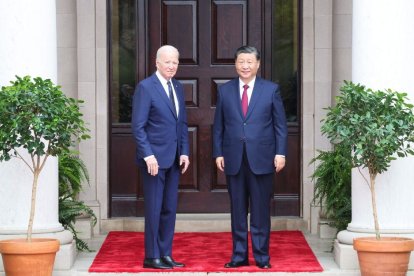Biden-Harris indifference facilitated China's conquest of Latin America
Pending a change in Trump's regional policy, the Communist Regime in Beijing created important economic ties with LATAM countries with ongoing infrastructure projects worth more than $280 billion.

Joe Biden and Xi Jinping in one of their last meetings.
China is embarking on its own conquest of the West in Latin America. Or rather of the East, if we take into account the position of the Asian giant on the globe. The Beijing Communist Regime has taken advantage of the indifference of the Biden-Harris Administration with respect to its southern neighbors to position itself as the hegemonic economic power in the region, and with agreements that have allowed them the presence of important infrastructures at the gates of their only rival in the world today. A decline and a rise that will meet in Peru, at the Asia-Pacific Economic Cooperation Forum (APEC).
Joe Biden's last international trip as U.S. president will take him to a meeting with his Chinese counterpart Xi Jinping. Both arrive at the summit in antagonistic situations with respect to the countries of the area and with few proposals on the part of the American to reverse the situation, while the Asian leader is presenting himself with a portfolio full of money and projects. At the moment, the US is only ahead in economic weight in Mexico and Colombia.
Trump's policy shift: containing China instead of appeasing it
Trump's victory in the elections could mean an important change, especially because one of his electoral promises is a change in policy towards China. The Republican has surrounded himself with people who consider the Asian giant the main threat to the country and wants to reverse the policy of constant appeasement that has characterized the Biden-Harris administration. Beyond a genuine interest in its relationship with Latin American countries, the new administration's main objective is to reduce Chinese influence so close to its borders.
In a statement, the Atlantic Council warns that the outlook, starting in January, "in Latin America and the Caribbean - with its thirty-three nations and 660 million inhabitants - Trump will face the reality that the United States has already lost a lot of ground. As General Laura Richardson, then commander of US Southern Command, warned last year, China 'is on the 20-yard line, in the red zone to our homeland'. Trump's promise to raise tariffs and tighten immigration controls will not be the move to meet that challenge." What's more, several analysts fear that Trump's protectionist and tariff policies will push countries in the region even further into the arms of China.
"China has replaced the U.S. as the dominant trading partner" in LATAM
While Biden-Harris looked the other way, "China has replaced the United States as the dominant trading partner of most major economies, with the exceptions of Mexico and Colombia. Beijing has signed up most of Latin America and the Caribbean to an infrastructure program that excludes the U.S. In Peru, Xi will inaugurate a megaport to accelerate trade with Asia," as summarized in a Wall Street Journal analysis.
This mega-port, in addition to the commercial opportunity it represents for the South American country, will be able to house Chinese warships, with the geopolitical and military challenge of having armament from a rival country, at the very least, at the doorstep of home. Moreover, as detailed by the WSJ, China's interests go further: it is a massive consumer of Argentine lithium, Venezuelan crude oil, as well as Brazilian iron and soybeans.
There are $286.1 billion in Chinese infrastructure projects in the region
According to William & Mary's AidData research lab in Williamsburg, Virginia, there is currently $286.1 billion allocated for Chinese infrastructure projects in in the region, including the Bogotá and Mexico City subways. In addition, Chinese companies have built ports for the transportation of goods, bridges, power plants and stadiums, reinforcing their presence and improving the vision that the citizens of these countries have of the Asian giant.
As if that were not enough, China also offers more facilities when it comes to paying these countries, which allows it to enjoy a better reputation as a debt collector. For example, Beijing has slowed commitments for new projects and adjusted the way in which some of its financing works.
Xi has visited the region more times than Trump and Biden combined
It's not just about money. Xi has visited the area on many more occasions than Trump and Biden combined, highlighting with his presence the importance for his country of its ties with South America. As Alvaro Mendez, director of a unit at the London School of Economics and Political Science that studies China's influence, told the WSJ "Xi promotes a model of governance that breaks with the U.S.-led postwar order, which he considers an obsolete relic of colonialism. Xi's sustained attention to the region is symbolic, and the countries of the Global South need that recognition."
Regardless, the situation is not lost for the U.S. in the region, and a rapprochement could return the country to the dominant position, despite China's current advantage. A Pew Research Center survey indicated that Washington has a higher favorability rating than Beijing in Argentina, Brazil, Chile, Mexico and Peru. But to do so, it would have to change the concept denounced by Jorge Guajardo, former Mexican ambassador to China: "The United States sees Latin America as 'ours to ignore'."
RECOMMENDATION





















